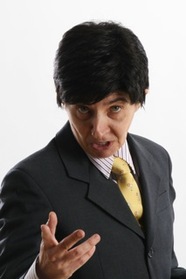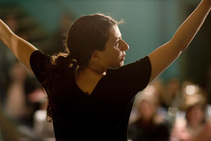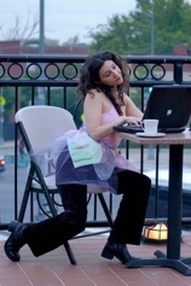|
Jacqueline Lawton: How long have you lived and worked as a playwright in DC? What brought you here? Why have you stayed?
Laura Zam: I’ve worked as a playwright in DC since I got here in 2001. After grad school at Brown, I was either going to stay in Providence or move to California. I even got a job in Berkeley that summer to see if I could set things up there as I love the Bay Area. However, on my way driving there (a yummy post-grad road trip), smack dab in the middle of the U.S., I got a call from an old friend, offering me a job at Arena Stage. The job was to be part of the Living Stage Company, a social-issue theater ensemble that creates devised work. I was offered the position of company member, dramaturg and assistant director. A full full-time job making theater? When do I pack? At Arena, I stayed for three seasons, eventually becoming Director of Education and Director of Southwest Community Programs. During that time, I was writing on the side, but it was difficult for me to balance this double life: I need to write in the morning; otherwise, it doesn’t happen. So I left Arena so I could start writing again. And I have! What’s kept me here is the community of smart, talented, worldly people. And also love. I met my husband here and we have set up a perfect DC life that is urban yet calm. JL: Have you ever been a member of a DC area playwrights writing group? If so, did you find it useful? Would you recommend that other playwrights join them? LZ: I was a member of the Ernie Joselovitz’s Playwrights Forum and also Playground Playwrights, which was housed at Woolley Mammoth. I found both these groups very helpful. More recently, I’ve had very intense collaborations with directors, artistic directors, and dramaturgs. This has replaced a writing group for me¾for these projects anyway¾because I don’t want too many opinions very early in the development process. In addition to these groups, I’m also an active member of DC-Area Playwrights, which is not a writing group: it’s a formalized (digital and in-person) community of playwrights and other theater folk. It’s an amazing way to be connected to other playwrights in town! JL: In DC, we have the Capital Fringe Festival, the Intersections Festival, the Source Theatre Festival, the Kennedy Center's Page-to-Stage Festival, the Black Theater Festival, and the Hip Hop Theatre Festival. We also have the Mead Lab at Flashpoint Theater Lab Program. Have you participated in any of these? If so, can you speak about your experience? LZ: I’ve put shows up in Fringe since it’s inaugural year in 2005, six of those have been one-person plays and one performance was a series of monologues written and performed by my solo performance students. I love Fringe, but I think it works best if it fits into a larger framework of development. For me, I use it to mount a piece for the first time. Then these pieces go on tour for many years afterward. I can work out kinks during Fringe and, hopefully, get good reviews (I’ve been pretty luck – spit, spit). All of this helps me get gigs afterward. So it’s a great investment of time and money. As for the other festivals, I participated once in Page-to-Stage and enjoyed it; I’d definitely do it again if I felt it helped my developmental process. For the first time, I’ll be participating in the Intersections Festival (March, 2013). I’m not sure what the future of this piece will be, but I’m sure I’ll find one. I’m all about the future! JL: What kind of work do you do to pay the bills? How do you balance this work with your writing? LZ: I make my living from a combination of writing (articles and essays), performing (touring one-person plays), and teaching. The latter mostly consists of my Solo Performance Lab and a workshop called How to Make a Living in the Arts, which is what you think it is. I also do some private coaching in both these areas. As an extension of my teaching, I work with traumatized populations, using the arts (storytelling and performance) to foster healing. For example, this fall I’m teaching a workshop at a healing retreat for female military veterans at the Omega Institute in Rhinebeck, New York. All of these endeavors comprise my career. In other words, I don’t see myself solely as a writer. So I don’t have to balance a day job. I do have to balance this career triad though, and this mostly comes down to scheduling. Essentially, I write all morning and then use the afternoons for everything else, including rehearsals, emails, phone calls, and sometimes teaching. Classes are held in the evening or on a Saturday. If I need more writing time, I cut into my afternoon activities. On my tombstone I’d like it to read: “She had complete control over her day and therefore she was happy.” JL: How many plays have you had produced in the DC area? Were any of these plays self-produced? If so, where and what did you learn from that experience? LZ: I’ve had six full productions in DC, and I’m about to have my seventh. Four of these were self-produced. In addition, since I tour my work, I frequently work with presenting organizations; in these instances, I sort of collaborate on producing. What I’ve learned from all these experiences is that it’s critical for a playwright to know how to get her work on the stage—from soup to nuts. Once a playwright does this, even once, she understands that she can always bring her work in front of an audience. There’s’ no need to wait for gatekeepers to validate or empower you. This DIY mentality is pervasive in all the arts right now. So if an artist not thinking this way, she is missing out on a lot of opportunities. She might even be missing the boat. Also, when I’m not producing I tend to be involved in all aspects of production anyway because I have an agenda: I’m going to do something with this play after the run. This is not to say I don’t love having a theater provide marketing, tech, directors, etc. I treasure this collaboration and support, but even in these instances, I want to make sure my vision is driving the production process. I never sit back and just let “them” take care of it. Self-producing has taught me that I can orchestrate things from all production angles. I have found that theaters appreciate this input as they are often understaffed. And who cares about your play more than you? JL: If you could be produced at any theatre in DC, which would it be and why? LZ: Well, right now I’m working with Theater J, who commissioned my newest play MARRIED SEX, and they’re producing a workshop presentation of it on September 23. This collaboration has been a dream come true. Shirley Serotsky is directing, along with Batya Feldman. Ari (Roth) has been essential in helping me shape this material. Based on this experience, I am interested in continuing to work with Theater J. I’d also love to work at Studio and to put something up in the Cradle (at Arena). JL: DC audiences are ... LZ: ... smart, sophisticated, and very worldly. They also like to have fun: I adore the silliness that comes out during Fringe¾from the artists but also the audience laughing their silly heads off. JL: DC actors, designers and directors are ... LZ: ... full of talent. And more keep arriving! Keep moving here, people! JL: DC critics ... LZ: For the most part, they are really interested in the health of the DC theater community. Along these lines, I have found them generous and constructive. I have especially found this to be true of the professional critics in town. I always read my reviews and take them to heart because I feel like most critics want me to succeed. Maybe I’m deluding myself, but that’s my impression. JL: How do you feel the DC theatre community has addressed the issues of race and gender parity ? How has this particular issue impacted you and your ability to get your work produced on the main stages? LZ: I’ve thought a lot about the lack of non-white voices on the stage. In a city that’s predominantly black, that seems very odd. That said, I know some theaters are, more and more, addressing this lack of representation. In terms of how it affects me: undeniably, I benefit from this White privilege. There’s no getting around that. So I try to voice my opinion about this as much as I can. This is very international city. I’d love to see more plays by people from all over the world, all races. When it comes to gender parity though, I have to say that it’s not something that I’ve really thought about until recently when statistics started going around regarding DC theater seasons and how many women vs. men were being produced. I think it’s ironic that most theater-goers are female (some say upwards of 70%); yet the overwhelming majority of produced plays were written by men. This seems ridiculous, so I’m in favor of changing this status quo and I’m involved in the conversation, but I’m also…careful when it comes to issues of injustice and women. I suppose I want to participate in a movement that feels constructive and empowering¾as opposed to something that paints women as victims. Making a connection to the previous question about self-producing, I can’t help but feel that women have exactly the same opportunity as men to do this, to take things into their own hands. So, for me, the answer lies more in continuing to produce my own work than in putting a tremendous amount of energy into changing theater seasons in town. I guess I’m not a radical. Or, I’m a different kind of radical. JL: What advice do you have for an up and coming DC based playwright or a playwright who has just moved to D.C.? LZ: Come out to any DC-Area event! Go see plays and introduce yourself to the theater artists. Join a writing group, especially if you are relatively new to your craft or need help with development. Find a director (or two) that loves your work. Cultivate a relationship with other theater people you admire. Put something up in Fringe or some other place where you can self-produce. JL: What's next for you as a playwright? Where can we keep up with your work? LZ: You can always catch me at LauraZam.com. In fact, I’m in the process of upgrading my site, but the old one works just fine for now. I’ll have a workshop presentation of MARRIED SEX on September 23 (5 pm) at Theater J. Here’s the link. After that, the play will be produced Off-Broadway next year. (I’m the lead producer on this production; self-producing in DC has taught me how to self-produce in NY as well!) I’ll be turning this play into a book this year also. As for teaching, I’ve got my Omega workshop and also My Solo Performance Lab starts on Sept 24. It’s a 6-week class in creating a solo show (a Level Two class immediately follows). Check it out here. I’ll be teaching How to Make a Living in the Arts as a course at George Mason University in the spring. Prior to this, I’m offering a one-day workshop for anyone on November 10. Here’s that link. On a final note, many thanks to Jackie Lawton for this fabulous opportunity. So glad to have great soul mates like her in town!
0 Comments
Your comment will be posted after it is approved.
Leave a Reply. |
My BlogI'm a playwright, dramaturg, and teaching artist. It is here where you'll find my queries and musings on life, theater and the world. My posts advocate for diversity, inclusion, and equity in the American Theatre and updates on my own work. Please enjoy!
Categories
All
Archives
June 2020
Reading List
|



